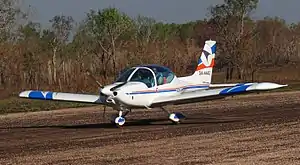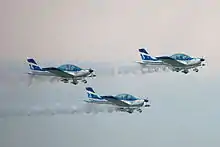Fly Synthesis Texan
The Fly Synthesis Texan is an Italian ultralight and light-sport aircraft, designed and produced by Fly Synthesis and which has been in production since 1999. The aircraft is supplied as a complete ready-to-fly-aircraft.[1][2]
| Texan | |
|---|---|
 | |
| Role | Ultralight aircraft and Light-sport aircraft |
| National origin | Italy |
| Manufacturer | Fly Synthesis |
| Introduction | 1999 |
| Status | In production |
| Produced | 1999-present |
Design and development
The aircraft was designed to comply with the Fédération Aéronautique Internationale microlight rules and US light-sport aircraft rules. It features a cantilever low-wing, a two-seats-in-side-by-side configuration enclosed cockpit under a bubble canopy, fixed or retractable tricycle landing gear and a single engine in tractor configuration.[1][2]
The aircraft is made from carbon fibre. Its 8.60 m (28.2 ft) span wing has an area of 11.80 m2 (127.0 sq ft) and flaps. Standard engines available are the 80 hp (60 kW) Rotax 912UL, the 100 hp (75 kW) Rotax 912ULS and the 85 hp (63 kW) Jabiru 2200 four-stroke powerplants.[1][2]
Operational history
On 23 November 2013, six Fly Synthesis Texans broke the Guinness world record for the lowest flying formation by flying at 422 m (1,385 ft) below sea level at the Dead Sea in Israel.[3]
Variants
.jpg.webp)
- Texan 600
- Version with a gross weight of 600 kg (1,323 lb) and with fixed landing gear, for the United States light-sport aircraft class. Known as the Lafayette Texan in the US.[1][2]
- Texan Top Class
- Version with a gross weight of 472.5 kg (1,042 lb) and with fixed landing gear, for the European microlight aircraft class.[1][2]
- Texan Club
- Version of the Texan Top Class with a gross weight of 472.5 kg (1,042 lb), with fixed landing gear and equipped with a 80 hp (60 kW) Rotax 912UL engine for the European microlight aircraft class.[1][2]
- Texan RG
- Version of the Texan Top Class with a gross weight of 472.5 kg (1,042 lb) and retractable landing gear for the European microlight aircraft class.[1][2]
Specifications (Texan Top Class)

Data from Bayerl and Fly Synthesis[1][4]
General characteristics
- Crew: one
- Capacity: one passenger
- Length: 6.90 m (22 ft 8 in)
- Wingspan: 8.60 m (28 ft 3 in)
- Height: 2.40 m (7 ft 10 in)
- Wing area: 11.80 m2 (127.0 sq ft)
- Empty weight: 289 kg (637 lb)
- Gross weight: 472.5 kg (1,042 lb)
- Fuel capacity: 100 litres (22 imp gal; 26 US gal) in two 50 litres (11 imp gal; 13 US gal) tanks
- Powerplant: 1 × Rotax 912ULS four cylinder, liquid and air-cooled, four stroke aircraft engine, 75 kW (101 hp)
Performance
- Maximum speed: 240 km/h (150 mph, 130 kn)
- Cruise speed: 200 km/h (120 mph, 110 kn)
- Stall speed: 64 km/h (40 mph, 35 kn)
- g limits: +4/-2
- Rate of climb: 6 m/s (1,200 ft/min)
- Wing loading: 40.04 kg/m2 (8.20 lb/sq ft)
References
- Bayerl, Robby; Martin Berkemeier; et al: World Directory of Leisure Aviation 2011-12, page 52. WDLA UK, Lancaster UK, 2011. ISSN 1368-485X
- Tacke, Willi; Marino Boric; et al: World Directory of Light Aviation 2015-16, page 55. Flying Pages Europe SARL, 2015. ISSN 1368-485X
- AOPA Israel (November 2013) New Israeli Guinness Record of lowest, below sea level, formation flight has been broken 23 November 2013, retrieved 13 March 2014
- Fly Synthesis (2011). "Aircraft description". Retrieved 27 June 2012.